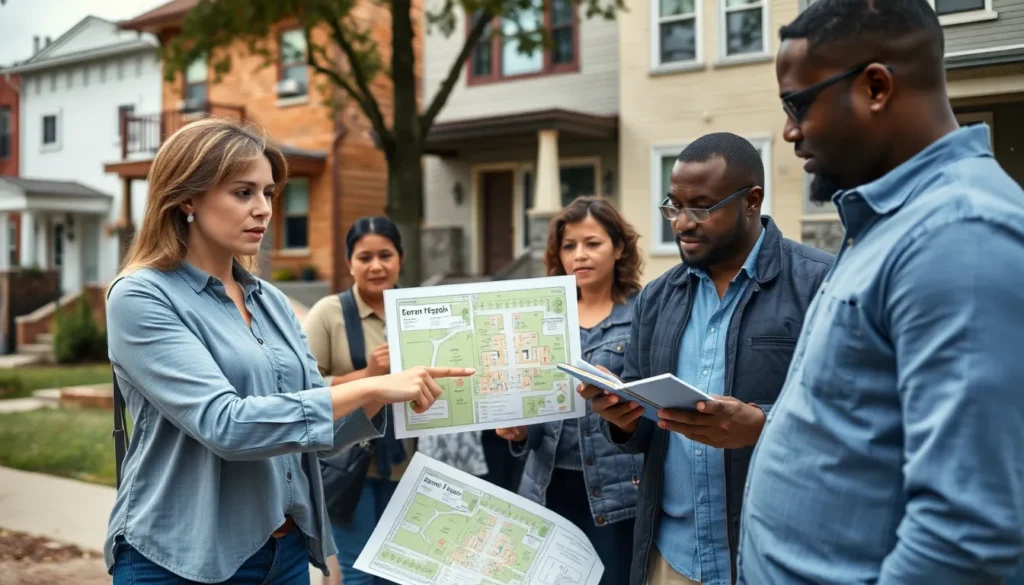Navigating the maze of zoning compliance can feel like trying to find a unicorn in a haystack. One minute you’re feeling confident, and the next, you’re knee-deep in regulations that seem to have been written in a secret language. But fear not! With the right tips and a sprinkle of humor, zoning compliance can go from a headache to a breeze.
Whether you’re a seasoned developer or a first-time homeowner, understanding zoning laws is crucial. After all, nobody wants to be the talk of the town for the wrong reasons—like that time someone tried to turn their backyard into a petting zoo. So grab a cup of coffee and get ready to dive into some essential zoning compliance tips that’ll keep you on the right side of the law while avoiding any zoning faux pas.
Table of Contents
ToggleUnderstanding Zoning Compliance
Zoning compliance involves adhering to local land use regulations. These regulations dictate how properties can be utilized within specific zones, affecting everything from residential developments to commercial constructions.
What Is Zoning Compliance?
Zoning compliance refers to the legal requirement of ensuring that a property’s use conforms to local zoning regulations. Each municipality establishes zoning ordinances that outline permissible activities, building heights, and land use classifications. Understanding these rules is crucial for anyone planning a project or purchasing property. Non-compliance can lead to fines, mandated alterations, or even demolition of structures.
Importance of Zoning Compliance
Zoning compliance holds significant importance for both developers and homeowners. Compliance prevents legal disputes and ensures that construction aligns with community standards. Familiarity with zoning laws enhances property values and promotes orderly development. Following these regulations can also lead to more sustainable land use, creating better living environments. Awareness of compliance obligations ultimately supports successful real estate ventures and minimizes potential liabilities.
Common Zoning Regulations

Understanding common zoning regulations aids in navigating compliance effectively. These regulations outline restrictions on land use, ensuring proper development and community standards are maintained.
Residential Zoning
Residential zoning focuses on land designated for housing. It typically categorizes properties based on housing types, such as single-family homes, multi-family units, or apartments. In many areas, minimum lot sizes are crucial, dictating the required space for each dwelling. Setback requirements establish the distance buildings must sit from property lines, contributing to neighborhood aesthetics. Zoning laws also govern density, limiting the number of dwellings per acre. Adhering to these regulations keeps developments aligned with community expectations.
Commercial Zoning
Commercial zoning regulates areas designated for business use. Different categories exist, including retail, office, and industrial zones. Regulations often define building heights, signage restrictions, and parking requirements to maintain order and accessibility. Specific zones may have mixed-use allowances, permitting both commercial and residential developments. Compliance with these regulations promotes safe, functional environments for businesses and residents alike. Understanding local commercial requirements ensures developers can operate successfully within defined areas.
Zoning Compliance Tips
Understanding zoning compliance demands diligence and meticulous research. Implementing effective strategies simplifies the process and minimizes potential issues.
Research Local Zoning Laws
Understanding local zoning laws starts with comprehensive research. Accessing municipal websites provides valuable information about land use regulations. Studying specific zoning designations clarifies restrictions on property use, such as residential and commercial categories. Also, reviewing comprehensive plans reveals long-term development goals for the area. Gathering zoning maps offers visual aids that highlight different zones and their respective regulations.
Consult with Local Authorities
Engaging with local authorities enhances compliance efforts significantly. Reaching out to zoning administrators addresses specific questions about regulations and requirements. Arranging meetings with planning departments helps clarify interpretations of zoning laws. Attending public meetings enables individuals to gain insights into future developments that may influence zoning plans. Building relationships with local officials fosters better communication and clarity on compliance matters.
Get Professional Help
Seeking professional assistance streamlines the zoning compliance process effectively. Hiring zoning consultants provides expertise in navigating complex regulations. Employing land use attorneys protects against legal pitfalls by ensuring all requirements are met. Collaborating with architects or surveyors aids in developing designs that comply with zoning standards. Utilizing professionals facilitates more informed decisions, ultimately reducing the risk of non-compliance.
Challenges in Achieving Zoning Compliance
Zoning compliance presents various challenges that require careful navigation and proactive management. Understanding and addressing these challenges ensures adherence to local regulations and successful property use.
Navigating Complex Regulations
Local zoning regulations can be intricate and varied across different municipalities. Each jurisdiction may impose unique requirements that complicate the compliance process. Studies show that inconsistent zoning laws across nearby areas may create confusion for developers and homeowners. Different zoning designations affect aspects such as property use, building dimensions, and land development. Clarity in these regulations is essential. Developers should thoroughly research local ordinances while consulting municipal resources. Comprehensive understanding minimizes the risk of non-compliance and fosters smoother project approvals.
Dealing with Non-Compliance Issues
Non-compliance can lead to serious consequences for property owners. Fines, mandated alterations, and even demolition orders often stem from zoning violations. Addressing these issues proactively is crucial. Taking immediate corrective action, such as applying for variances or adjusting building plans, mitigates potential penalties. Communication with local authorities fosters a better resolution of disputes. Engaging legal counsel experienced in zoning regulations proves beneficial in navigating conflicts. Seeking proactive solutions and staying informed about local zoning changes is critical in avoiding compliance issues altogether.
Zoning compliance is essential for anyone involved in property development or ownership. By understanding local regulations and engaging with authorities, individuals can avoid costly mistakes and ensure their projects align with community standards. Proactive management and professional guidance can simplify the compliance process. With the right approach, navigating zoning laws becomes less daunting, paving the way for successful and sustainable development. Staying informed and prepared is the key to making the most of property opportunities while adhering to necessary regulations.







